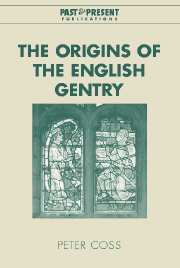Book contents
- Frontmatter
- Contents
- List of illustrations
- Preface
- 1 The formation of the English gentry
- 2 The roots of the English gentry
- 3 The Angevin legacy: knights as jurors and as agents of the state in the reign of Henry III
- 4 The crisis of the knightly class revisited
- 5 Knights in politics: minor landowners and the state in the reign of Henry III
- 6 Knighthood, justice and the early Edwardian polity
- 7 The explosion of commissions and its consequences
- 8 Identity and the gentry
- 9 Knights, esquires and the origins of social gradation in England
- 10 Crystallisation: the emergence of the gentry
- Appendices
- Bibliography
- Index
- Past and Present Publications
5 - Knights in politics: minor landowners and the state in the reign of Henry III
Published online by Cambridge University Press: 10 December 2009
- Frontmatter
- Contents
- List of illustrations
- Preface
- 1 The formation of the English gentry
- 2 The roots of the English gentry
- 3 The Angevin legacy: knights as jurors and as agents of the state in the reign of Henry III
- 4 The crisis of the knightly class revisited
- 5 Knights in politics: minor landowners and the state in the reign of Henry III
- 6 Knighthood, justice and the early Edwardian polity
- 7 The explosion of commissions and its consequences
- 8 Identity and the gentry
- 9 Knights, esquires and the origins of social gradation in England
- 10 Crystallisation: the emergence of the gentry
- Appendices
- Bibliography
- Index
- Past and Present Publications
Summary
The period from the Angevin legal reforms to the period of baronial reform and rebellion of 1258–67 has long been regarded as an important stage in the development both of the English state itself and of the relationship between the central government and local society. Whereas the Whig historians looked to Magna Carta as the foundation of English liberties, modern historians have looked to this period for the origins of the three-cornered parliamentary polity of the fourteenth century and beyond. From John Maddicott, in particular, we have learned to appreciate the contribution of the reign of Henry III to the developing interaction between the crown and provincial institutions.
It is not my intention to deny the significance of this interaction, nor indeed to deny the immense long-term consequences of the changes wrought in Angevin England. One has only to consider the rise of the common law and the concomitant steady growth of a direct relationship between the free man and the state. When it comes to the question of the gentry, however, a series of phenomena have tended to be taken out of context and combined in such a manner as to distort contemporary reality. The participation of county knights in the reform movement of 1258 has been seen as the outcome of cumulative office holding and judicial participation on the one hand and of a sort of collective responsibility on the other: the result of a heightened sense of public duty born of ‘self-government at the king's command’.
- Type
- Chapter
- Information
- The Origins of the English Gentry , pp. 109 - 135Publisher: Cambridge University PressPrint publication year: 2003



